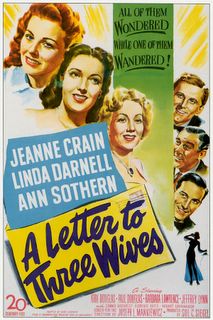My wonderful brother J.R. told me some time ago of a reference to the city of Wilkes-Barre in the 1949 Academy Award-winning film A Letter To Three Wives, written and directed by Joseph L. Mankiewicz.
Mankiewicz, who was born in Wilkes-Barre, also wrote the screenplay to All About Eve, which also included a reference to Wilkes-Barre in the dialogue (All About Eve was also the inaugural entry in this blog). Coincidentally, both A Letter To Three Wives (1949) and All About Eve (1950) won back-to-back Oscars for Best Screenplay (as well as Best Director) for Mankiewicz, the only such occurrence in the history of the Academy Awards. This distinction gives Wilkes-Barre, PA an ultra-rare (though unnoted until now) historic footnote in the history of cinema—city references included in two screenplays by the same author that won two consecutive Oscars.
Joseph L. Mankiewicz was born in Wilkes-Barre, PA on February 11, 1909. He began his career in film as a translator of intertitles for Paramount in Berlin. Upon returning to Hollywood, he worked as both a screenwriter and producer throughout the thirties and forties; he also produced several films starring Joan Crawford (including 1942's Reunion in France, which features several references to Wilkes-Barre). After directing his first film Backfire in 1946, Mankiewicz went on to direct such classics as The Ghost and Mrs. Muir, Now Way Out, Guys and Dolls, Cleopatra and, of course, All About Eve—which still holds the record of the most Academy Award nominations (14) in film history (tied with Titanic).
A Letter to Three Wives stars Jeanne Crain (State Fair, Cheaper By The Dozen), Linda Darnell (Mankiewicz’s No Way Out, Unfaithfully Yours) and Ann Sothern (Lady in the Lark, The Whales of August) as three friends in an affluent neighborhood. As they are boarding a ship to chaperone a school trip, a mailman delivers a letter addressed to the three of them from their friend (and town floozy) Addie Ross. Addie writes that she is leaving town for good and taking one of their husbands as a momento—neglecting to reveal exactly whose husband she stole. Though they display a brave front and a nonchalant attitude, each of the three women spends the day reminiscing about the ups and downs of her marriage -- wondering if hers is the husband who has flown the coop.
The Wilkes-Barre reference occurs during the flashback of “wife” Rita Phipps (played by Ann Sothern), a writer for radio shows. As she is having dinner with her possibly straying husband George (Kirk Douglas) and her radio show’s sponsors, a commercial for a breath mint begins playing during the radio show “Confessions of Brenda Brown.”
Announcer:
Euclid Street. Wilkes-Barre, Pennsylvania. What a thrill it was to hear my little girl say, “Mother, it’s much fun to have you read to us, now that you use Baby’s Breath.”
On the audio commentary on the DVD of A Letter To Three Wives (at 48:00), Joseph Mankiewicz's son Christopher explains that his father "never missed a chance in any screenplay that he wrote to pay homage to his city of birth and get it in the script."
A Letter to Three Wives is available for loan on DVD from the Lackawanna County Library System. To place a hold on the DVD, click here; to reserve the VHS, click here.

